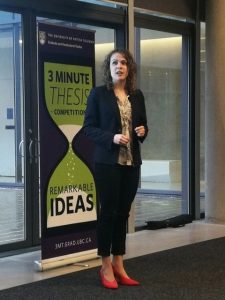
Written by Maria-Elizabeth Baeva, Jefferies Lab alum
Edited by Yanina-Yasmin Pesch, Postdoctoral Researcher, Tanentzapf Lab
This story was originally submitted, in a shorter form, to the 2020-2021 Canadian Blood Services Lay Science Writing Competition, which was organized by the Canadian Blood Services’ Centre for Innovation with support from the UBC Centre for Blood Research. The competition theme was “Challenges 2020”.

Maria-Elizabeth Baeva presenting at the UBC Three Minute Thesis (3MT) in 2019, an academic competition where graduate students explain their research project to a non-specialist audience in just under three minutes. Maria-Elizabeth was a semi-finalist in the competition.
I have a confession to make: I adore public speaking. Ever since I finished in last place at my first orator competition at age twelve, I realized that I loved speaking in front of an audience. I often find myself giving talks about science at various venues: whether it’s at Science World, a conference for patients with multiple sclerosis, or a bar in the art district of Vancouver.
Once, I was presenting my research on Alzheimer’s disease at the downtown public library. As has happened several times before, a few audience members came up after the presentation to ask questions, but not about my research. Instead, the inquiries were either more general: “When will they find a cure for Alzheimer’s disease?”, or very specific: “My mom was just diagnosed with Alzheimer’s and I read that pomegranate juice can help, is this true?”
It’s those questions that are the hardest to answer: when the scientific enters the unknown and entangles with the personal. As a researcher, I am told that my role is to be an objective truth seeker. But what do you say to someone desperate for hope and all you can offer is “the science is inconclusive” or “the results are not statistically significant”? I finally understood the hesitancy that many scientists have regarding talking to the general public about the nuances of the unexplained.
How do we balance the seemingly mutually exclusive concepts of human empathy and scientific reason? I don’t have all the answers, but throughout my years of public speaking, I’ve learned a few lessons that I would like to share.
The first is that people want to learn. If you avoid speaking the truth, they will find “it” elsewhere. With the Internet democratizing knowledge and the epistemic drive inherent in all of us to understand the world in ways that are comprehensible and satisfying. If scientists are not actively engaging the public, the consequences can be tragic. For example, if someone with a family member suffering from an uncurable cancer is desperate for any source of hope and their physician is unable to explain research in an understandable manner, then they may stumble upon the Facebook group “Curing Cancer Naturally – True Stories from Real People” which has roughly 60,000 members and suggests “organic food, fruits, vegetables, alkaline water, herbs, spices, probiotics, sauerkraut, kombucha” and, yes, even “pomegranate juice” as alternatives to chemotherapy.
My next tip is to listen to questions with the analytical mind that we typically reserve for research. What does the person truly want to know? Does the person actually believe that pomegranate juice is the answer? Maybe or maybe not, but the seeker wants affirmation that their concerns are being heard and that their efforts are legitimate.
Finally, just as there is more than one way to run an experiment, there’s more than one way to communicate. I can say that pomegranate juice will not cure Alzheimer’s disease, or I can say that studying one of its ingredients can be an idea worth investigating. But we must be careful not to overpromise and underdeliver, scientific research is after all slow, methodical and often gives disappointing results. We can still offer hope by being kind, empathetic, and using the listening skills I mentioned in the previous suggestion. By trusting the intelligence and lived experience of our listeners, we are using reasoning to guide them to comfort rather than ignoring their feelings and potentially scaring them away.
How do we balance the seemingly mutually exclusive concepts of human empathy and scientific reason? I don’t have all the answers, but throughout my years of public speaking, I’ve learned a few lessons that I would like to share…
Now that we are over a year into a global pandemic, I’m thinking about how we talk about the unprecedented more frequently. While scientists are slowly learning about the virus, what do we say in the meantime? Do we sit silently and patiently wait for concrete data to arrive, or do we use logic and compassion to inform those around us, even if we don’t have all the facts yet? Although this may seem like an oxymoron, it’s more important than ever that scientists become an ever-present voice even if there’s not much to declare. Maybe we all need to stop for a moment, drink some pomegranate juice and reflect on our obligations to our community.
During this moment of introspection, I would like to point out that although we typically associate pomegranates with the story of Hades and Persephone, there’s a different Greek character I want to incorporate into my metaphor: Charon, the ferryman of the underworld. Because, without him, the great heroes Heracles, Odysseus, and Orpheus could not journey to the underworld and return alive to complete their adventures.
Read more entries from the 2020-2021 Lay Science Writing Competition:
- Joint winning entry: “Lost in lab: deciphering blood immune cells to fight COVID-19” by Melina Messing, PhD Candidate, McNagny Lab
- Joint winning entry: “Developing cell biology lessons for seniors in the age of COVID” by Polina Petlitsyna, CBR/SBME summer student alum
- Runner-up entry: “2020: The Year No One Expected – Challenges Researchers Face during a Global Pandemic” by Sarah Longo, McMaster University/MCTR undergraduate student


